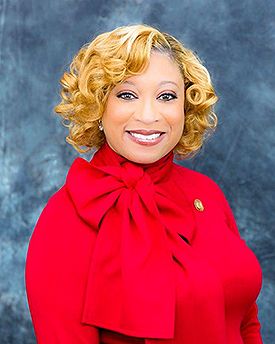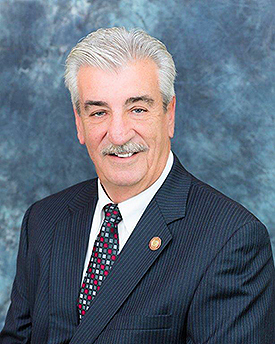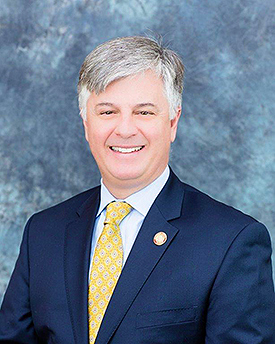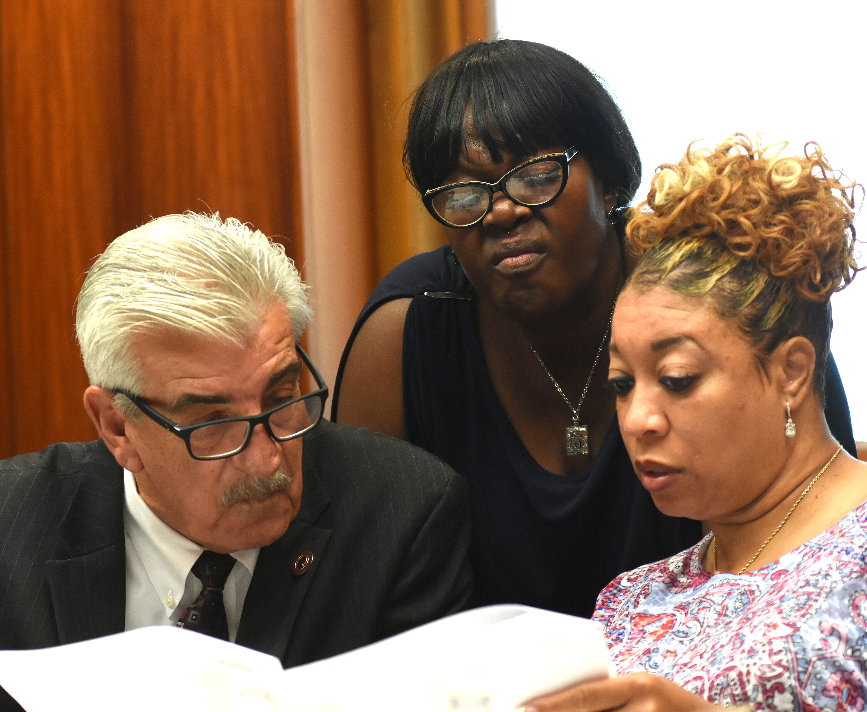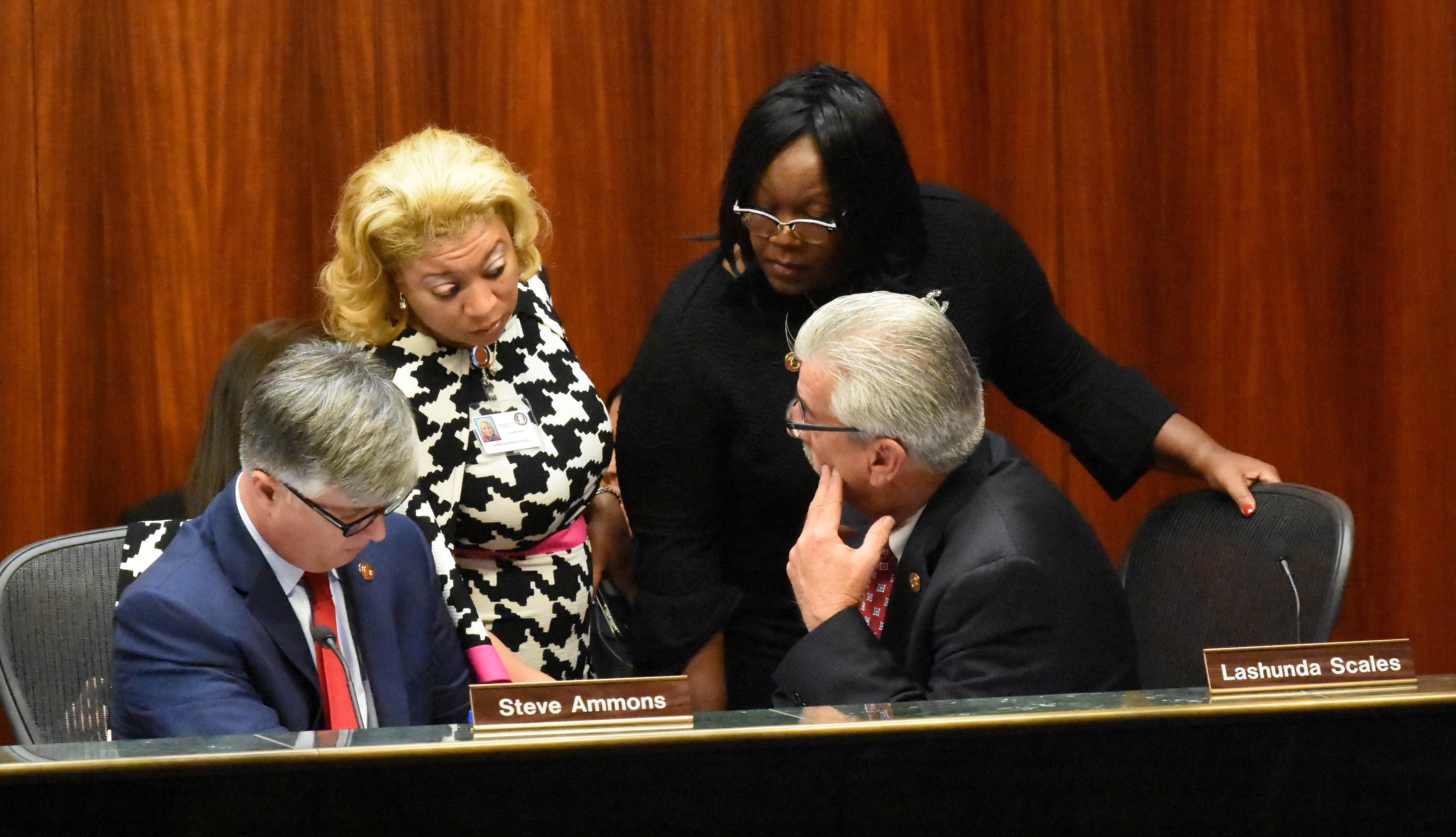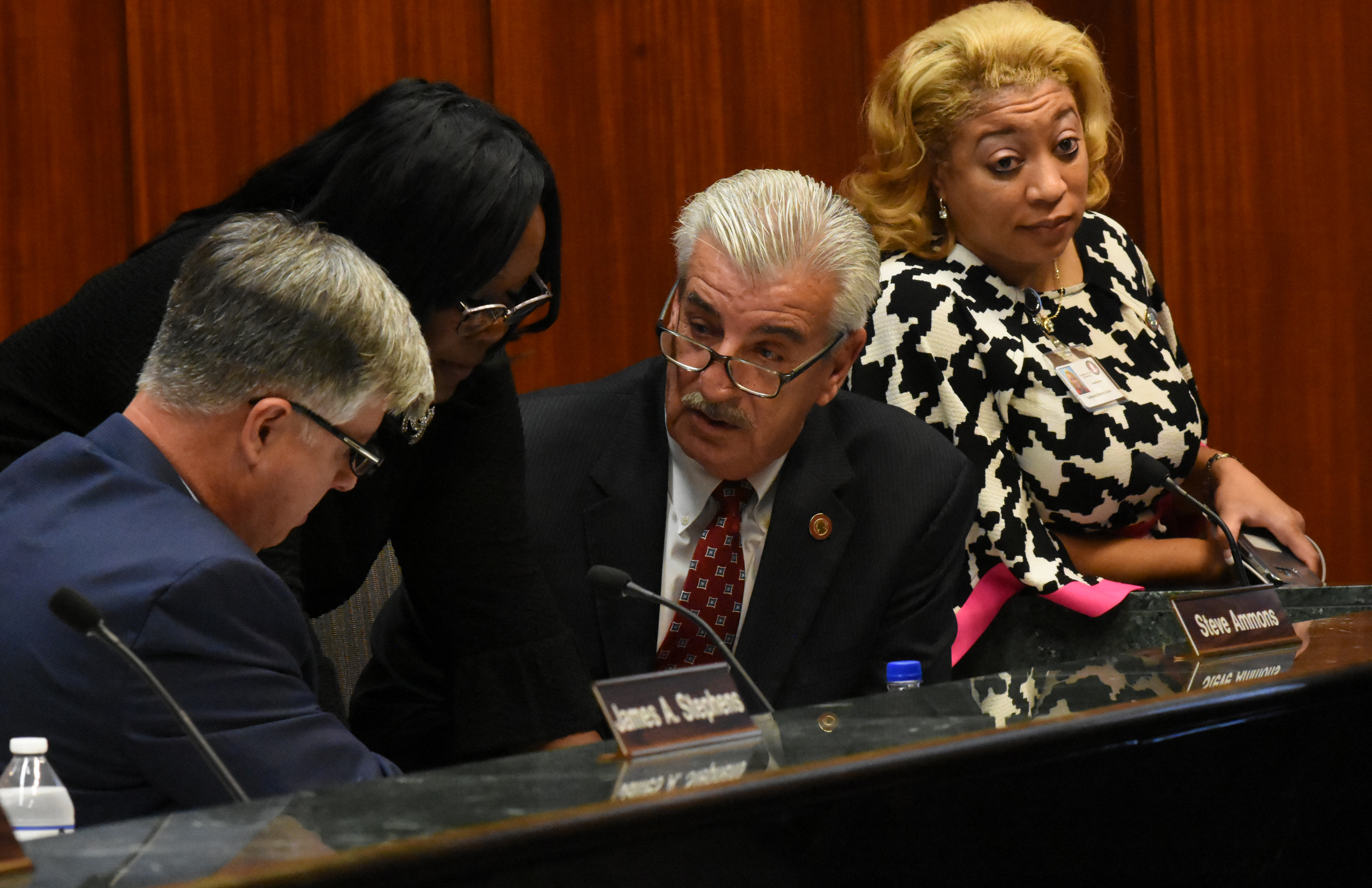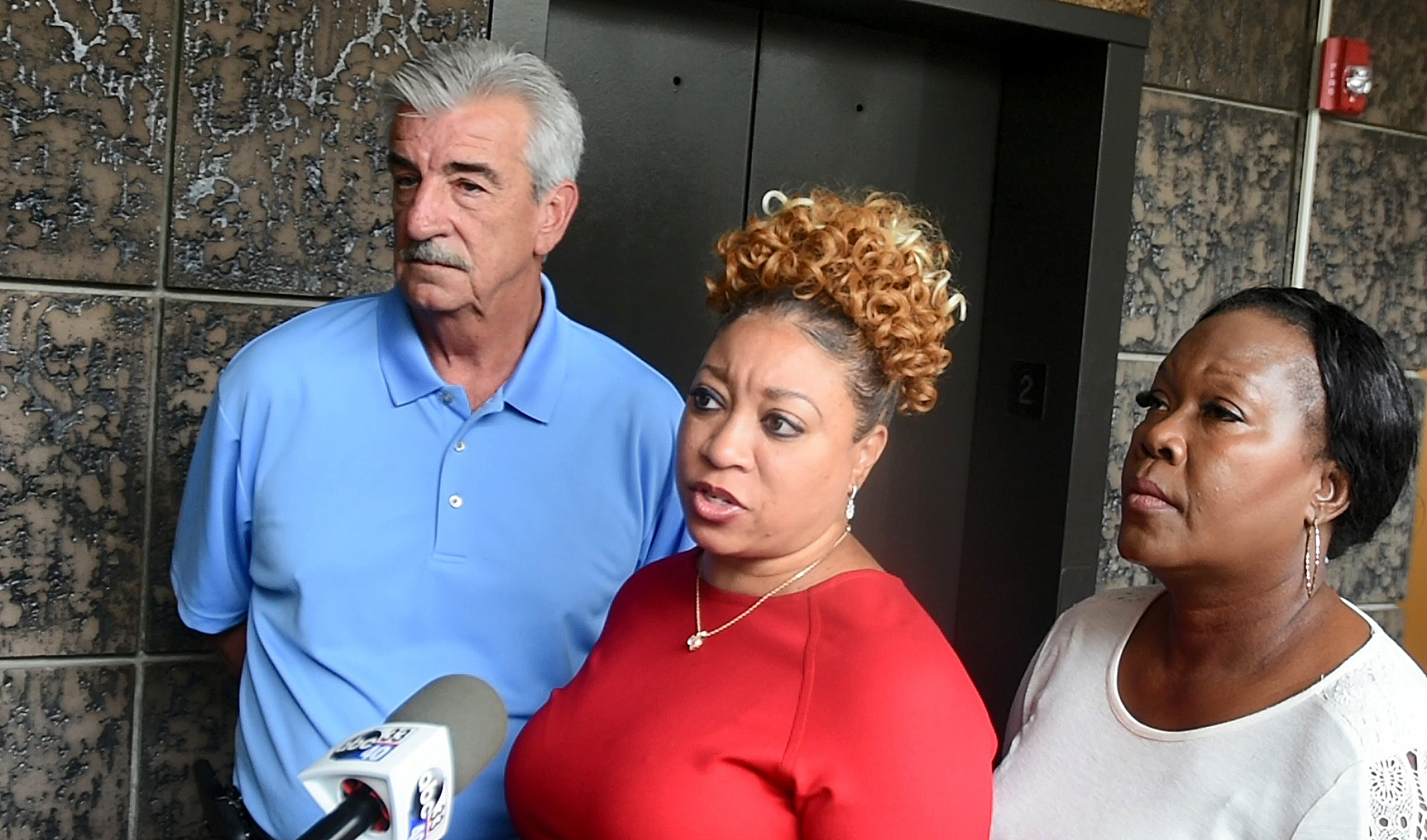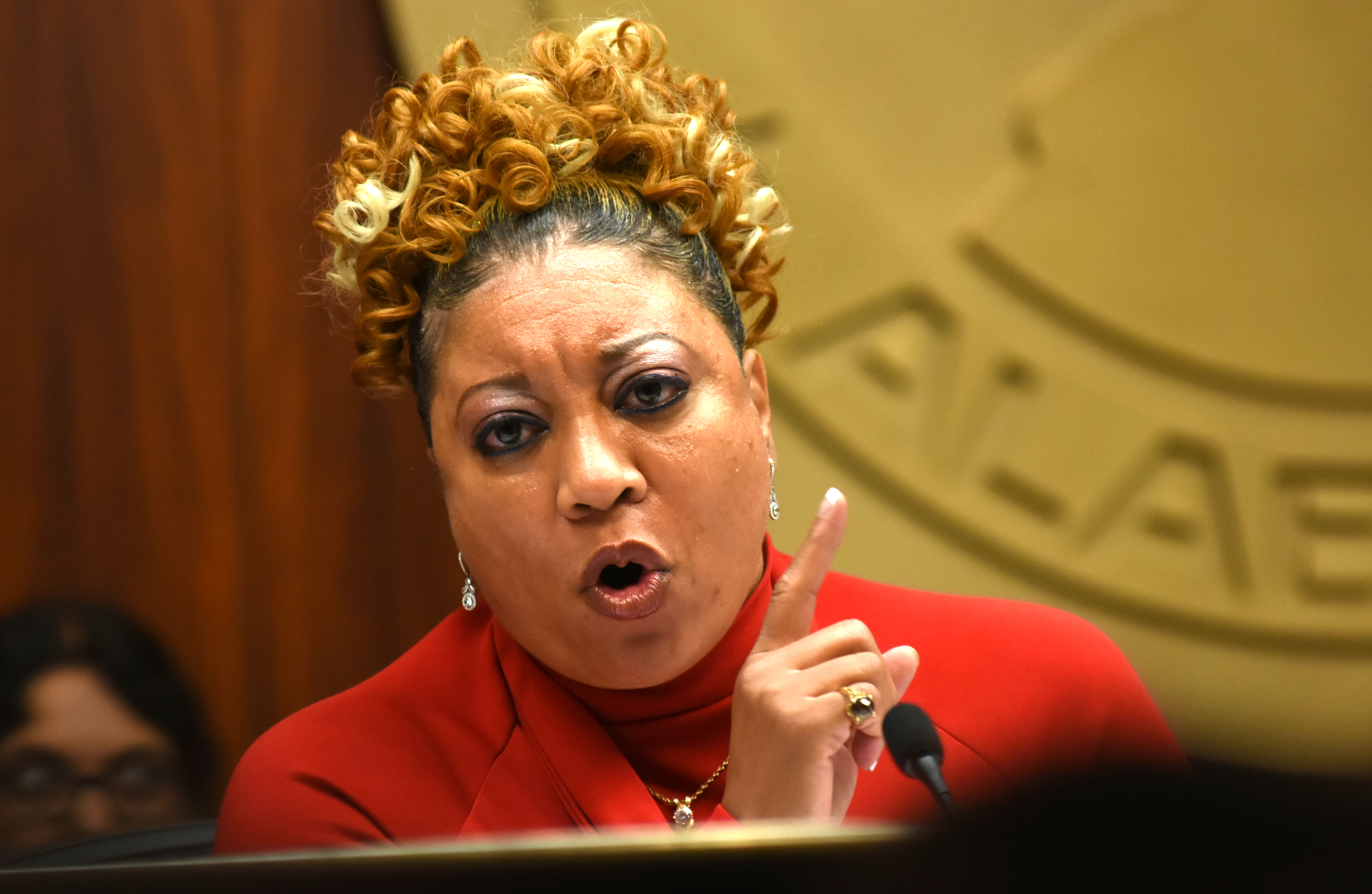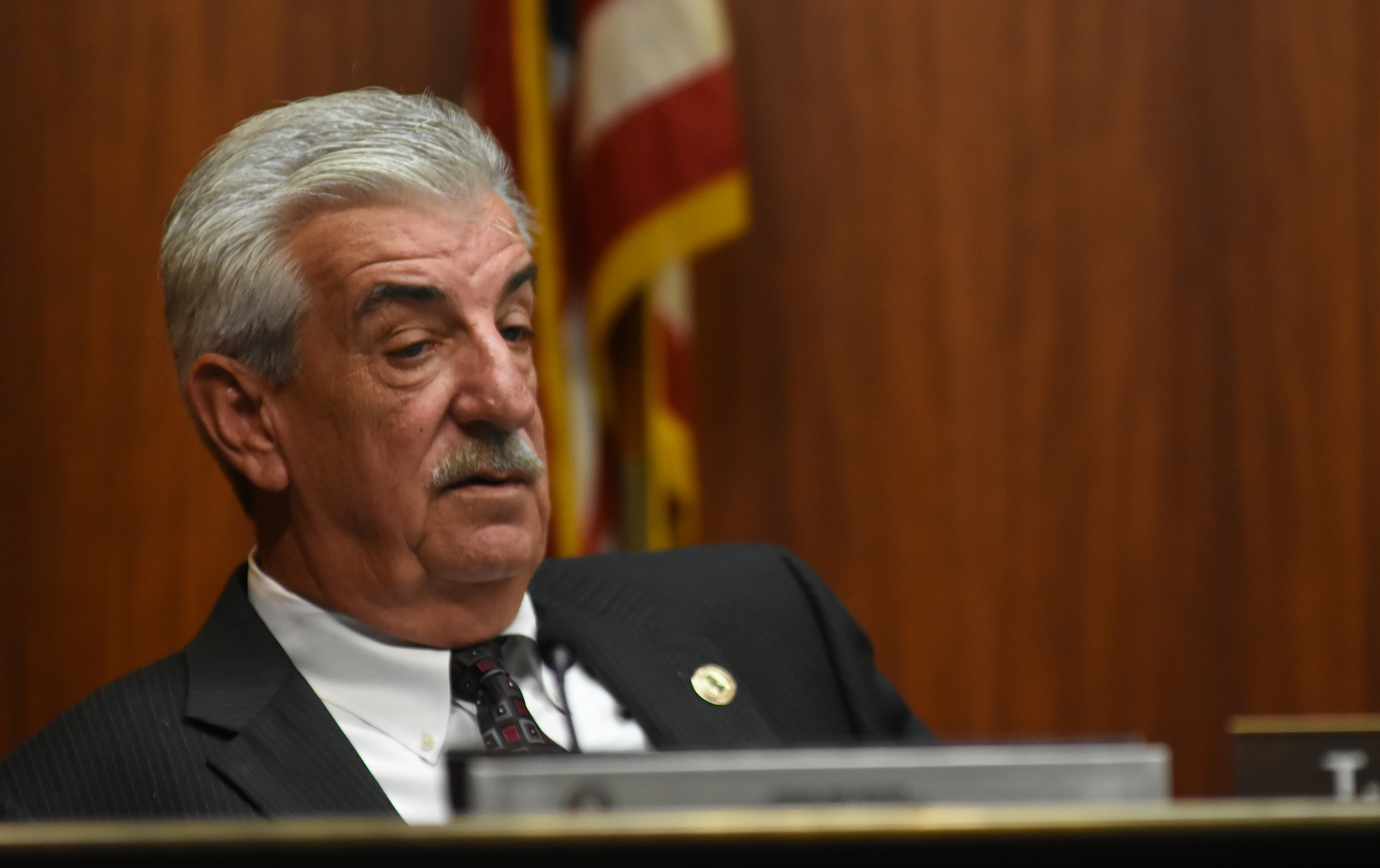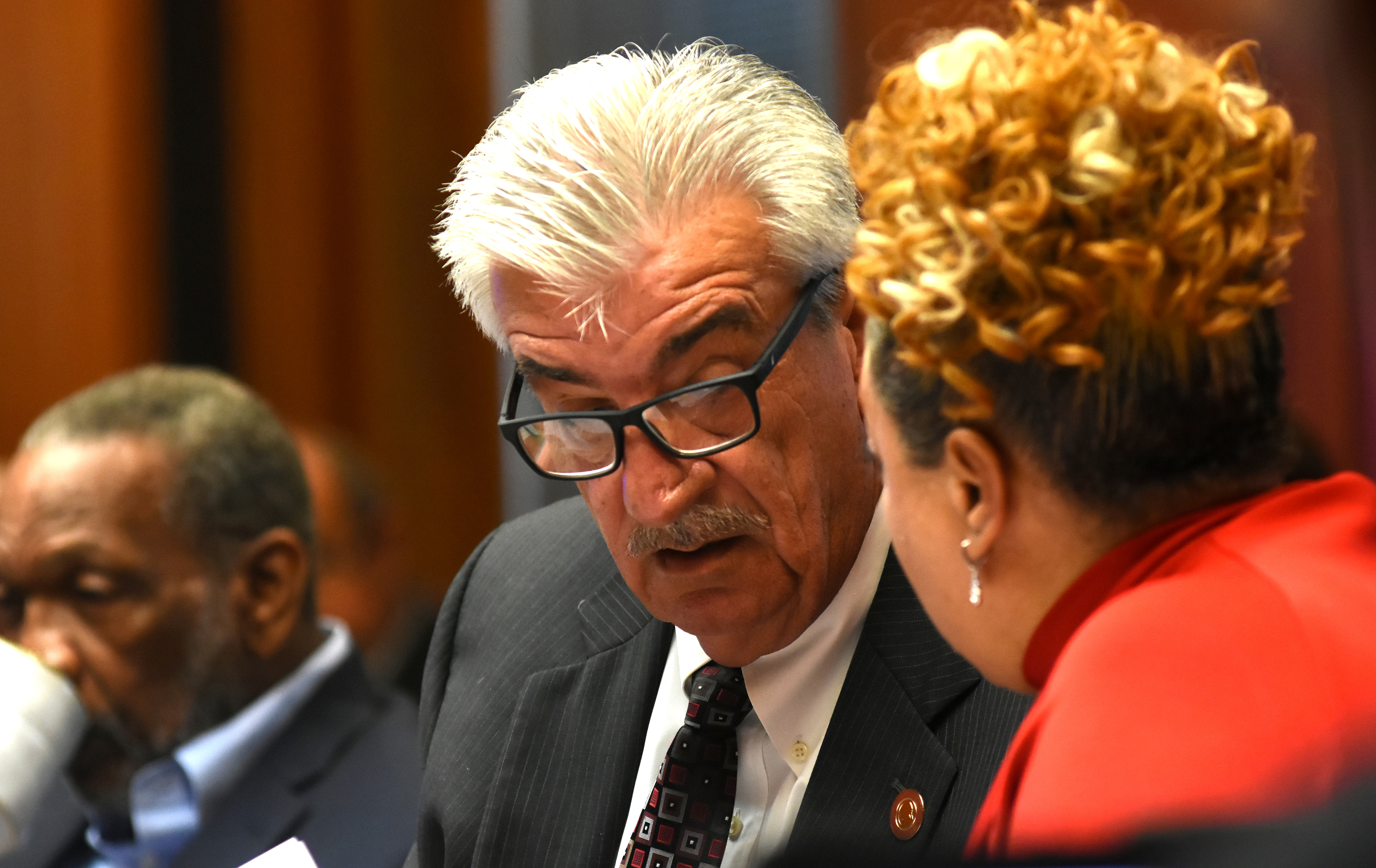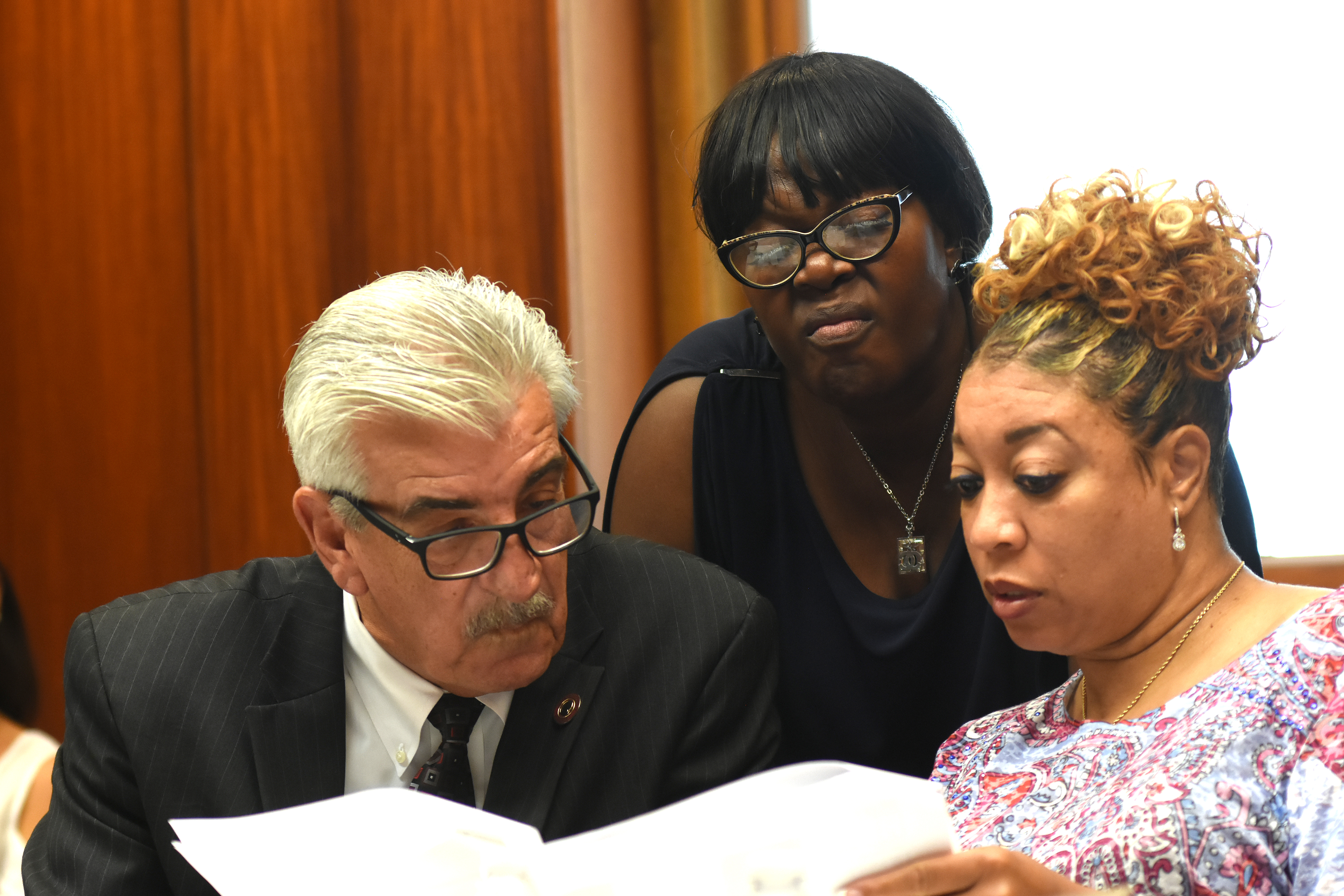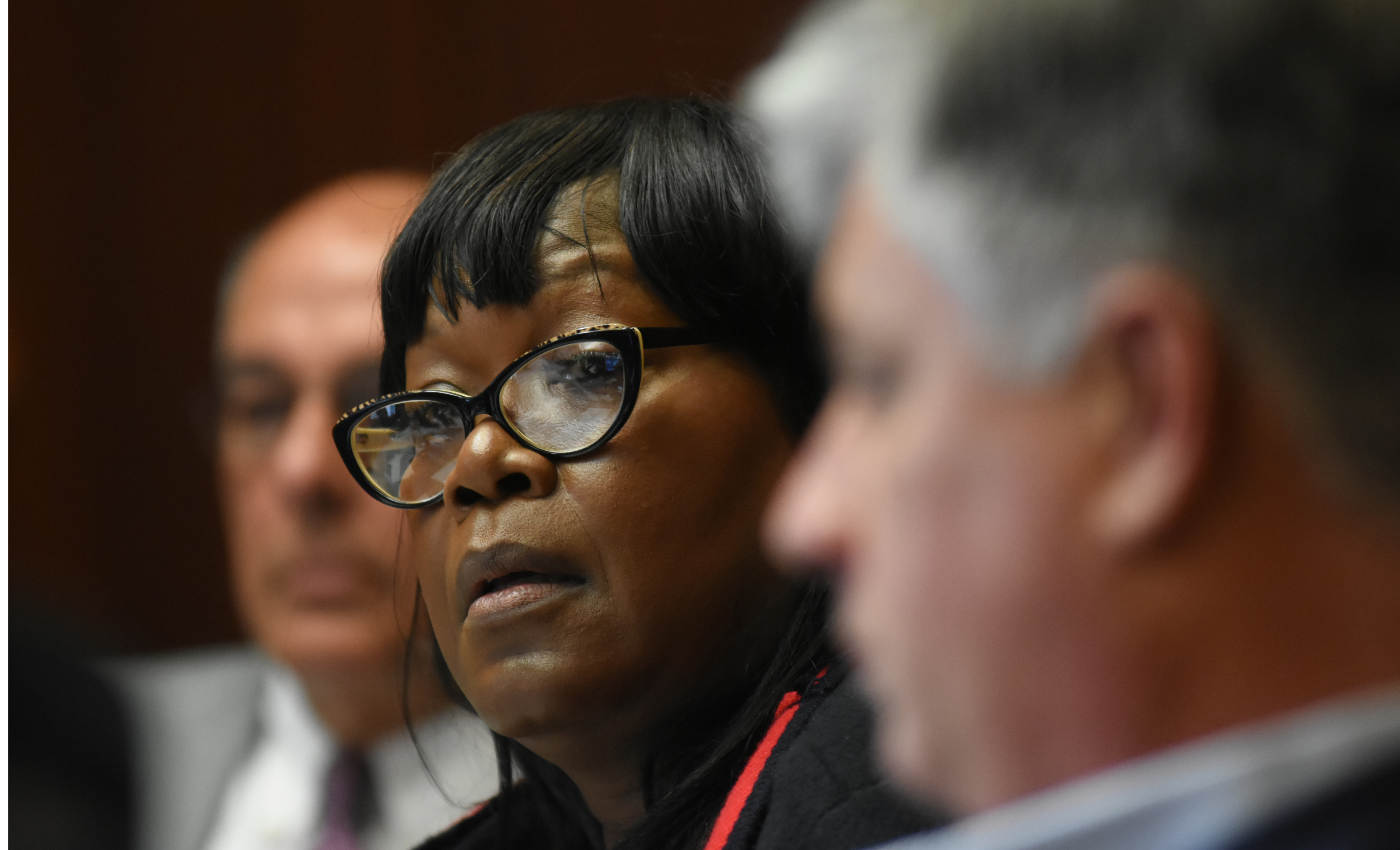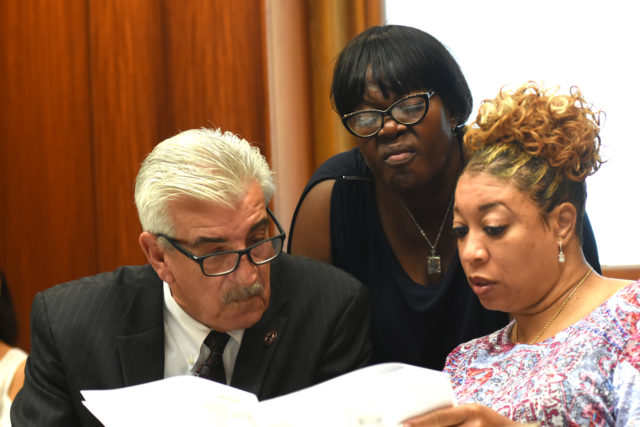
By Barnett Wright
The Birmingham Times
At 8:03 on a warm summer morning, Jefferson County Commissioner Lashunda Scales entered a crowded conference room in the downtown Birmingham, Ala., courthouse and took her normal seat near the head of the table between Commission President Jimmie Stephens to her left and Commissioner Joe Knight to her right.
Scales, a Democrat and commission president pro tempore, always sits between the two Republicans. They sit across from Commissioner Sheila Tyson, a Democrat, and Commissioner Steve Ammons, a Republican, meaning the GOP has a three-member majority—the same way it’s been for the past three decades in Alabama’s most populous county.
Before the day ended, however, it would be clear how much the Democrats have not only come between Knight and Stephens but also shifted the balance of power in favor of the Democrats on the five-member commission.
Scales, Tyson, and Ammons are nine months into their first terms, having been seated in November. Stephens and Knight are at the start of their third terms, having first been elected in 2010. The two senior Republicans went through a hotly contested battle for commission president in November, and the ongoing rift has created an opening for the two Democrats—Scales and Tyson—to make gains unimaginable a year ago.
Last month, for instance, the Jefferson County Commission approved a $700 million budget on a 3-2 vote with Knight, Scales, and Tyson in the majority and Stephens and Ammons in the minority.
“We all used to work together, [but] it appears there is a division in the commission,” said Stephens, the District 3 commissioner, afterward. “[Knight] has let our personal differences interfere with his ability to fairly administer. … He’s aligned [with the Democrats on some issues] that allow him to perhaps enjoy a level of influence he feels he lacks.”
Knight said there would be no division if Stephens would stop interfering in areas not under his responsibility—such as oversight of the commission’s finance committee, where Knight is the chair.
“Maybe [Stephens] needs to let the finance chair be the finance chair, [then] there won’t be any problems,” said Knight, the District 4 commissioner.
Democrats Wield Influence
With Knight and Stephens at odds, the recent county commission budget process showed how much influence the Democrats now wield in Jefferson County. The recently adopted $700,263,145 budget for fiscal 2020 contains items that haven’t been funded in more than a decade—and that’s in large part because of Scales, who represents District 1, and Tyson, who represents District 2. The two democratic commissioners, whose districts are mostly in Birmingham, pushed for a $1.225 million public-service fund with money going toward projects they support, such as the Magic City Classic football game ($200,000), the Birmingham Jefferson County Transit Authority ($250,000), and the Rev. Dr. Martin Luther King Jr. Unity Breakfast ($15,000); the fund also contains money for nearly two dozen other organizations and programs, including the Girl Scouts ($25,000), Crime Stoppers of Metro Alabama ($25,000), and the Sidewalk Film Festival ($25,000).
Stephens said the budget deviated from the county’s “past patterns and practices.”
“We need to save for an economic downturn or for a rainy-day fund for our constituents,” he said. “The last thing I want to do is lay off another county employee because of an economic downturn. What we’ve done in this [budget] is … spend [our cash reserves]. … This is like waiting on the storm. It’s not if it’s going to happen, it’s when, [and] we are going to be in a sad shape to properly deal with those circumstances.”
The Democrats saw it another way. The budget was about meeting the needs of Jefferson County, Scales said, “[through] our departments and making sure our citizens have a fair and equitable lifestyle.”
That included a total of $58 million for roads in the budget, about $8 million more than last year. And that’s also why she and Tyson pushed for a first-time-ever sewer fee assistance fund in the amount of $1.25 million to help low-income residential customers pay sewer bills. Tyson said she was able to get Knight to understand the need for both the public-service fund and sewer-assistance program.
“I showed Knight the history of the county and put it to where Knight could see that it was a one-sided government: one side was getting more than the other,” she said. “We were racially divided, we were class divided, and we were gender divided.”
Tyson also pointed out the economic impact of the Magic City Classic, which adds about $25 million to Jefferson County’s economy, she said.
Knight said the Classic is the second largest event in Birmingham every year, behind the Honda Indy Grand Prix of Alabama race. Every hotel is sold out for three to four nights for the annual football game between Alabama State University and Alabama Agricultural and Mechanical University, and the Riverchase Galleria has probably “one of [its] busiest times, other than Christmas,” he added.
As for the sewer fee assistance fund, residents throughout the county need help with bills, Tyson said.
“They need the same thing my folks need. I [represent] the poorest district in Jefferson County,” she said. “[Other commission districts] have poor people, too. It may not be the majority of the county. It’s just common need. We need to assist the people.”
Others have taken notice of Tyson and Scales, two former Birmingham City Council members who are having a visible impact on the county since being seated nine months ago.
“They are unlike the dynamics we had on the last commission, [with Sandra Little Brown representing District 2 and George Bowman representing District 1],” said Knight. “[Scales and Tyson] are more assertive. They are adamant about representing their districts. [It’s] not that the others weren’t, … but [Scales and Tyson] made promises on their campaigns that they were going to do things to help the people.”
BWWB Visit
Six days after the Jefferson County Commission adopted its fiscal 2020 budget, Birmingham Water Works Board (BWWB) officials assembled for their August regular meeting and were met with an unusual sight: a large contingent of television cameras and reporters. Soon they would know why.
Scales, a master media maven who founded Scales PR Marketing Firm Inc. in 2000, had issued a press release to media titled “Jefferson County Commissioner Lashunda Scales Seeking Partnership with Birmingham Water Works Board to Assist Sewer Customers.” Scales was scheduled to speak to BWWB officials at 11:30 a.m., and some of the media were at the utility’s offices by 11 a.m.
As with most of her appearances, Scales had the event livestreamed by a member of her staff who broadcasts her speeches via the internet. With the BWWB meeting being recorded, Scales, joined by Knight and Tyson, requested that the board match the county’s $1.25 million sewer fee assistance fund with a contribution for their water customers. During the 30-minute presentation, Scales at times spoke “on behalf of” the commission.
“All we’re seeking is the partnership and collaboration [through which] we can provide sewer relief in terms of $1.25 million, water relief in the amount of $1.25 million,” Scales said.
BWWB officials sent the matter back to their finance committee for further review because, they said, a number of questions needed to be answered. The biggest question for some who watched via livestream or recording had nothing to do with the sewer fee assistance fund, however: Republicans were asking about Knight and his newly formed alliance with the Democrats on the commission.
“I worked closely with Commissioner Knight for eight years,” said former County Commission President David Carrington on the Matt and Aunie radio show, hosted by Matt Murphy and Andrea Lindenberg on Talk 99.5 WZRR-FM. “[Knight’s] actions these last few weeks do not reflect his core values, the core values I’ve observed, nor do they represent the core values of the majority of his constituents. This is nothing more than a childish political retaliation [by Knight] for Commissioner Stephens and Commissioner Ammons not electing him president of the Jefferson County Commission.”
Carrington, a Republican, served on the commission from 2010 to 2018.
Knight denied that his budget vote and BWWB visit were retaliation for the vote for president, but he did say he’s had a “few calls” from Republican friends asking him, “What the hell are you doing?”
Commission President
Three months before the new commission was seated, Knight and Stephens held a private meeting in Stephens’s office to decide who would serve as president for the 2018–2022 term. By that time, Stephens was confident that he had the votes to be president and offered Knight the president pro tempore position, which Knight took as an insult.
“I said I would make him pro tem,” remembered Knight, who said he walked out of the meeting.
The relationship between the two hasn’t been the same since. Knight had sought the presidency of the county commission at the start of each of his three terms and lost to Carrington in 2010 and Stephens in 2014 and 2018. Stephens said he was the best person suited for president this term because “we have three new commissioners that need to be brought along. That’s a big enough change for this commission without having to go through a change in leadership,” he said.
Besides lacking votes for the presidency this term, Knight began to perceive more slights, such as being passed over for assignments he felt should go to him and not to the recently elected Ammons. For example, Stephens assigned Ammons as chair of the finance and economic-development committees.
“I’ve been the third wheel for eight years,” Knight said. “I have never been finance chair. There are reasons [Stephens] didn’t want me to be the finance chair, I think.”
Stephens said he gave finance to Ammons because “I felt that [Ammons] was more skilled in finance based on his background [as a small-business owner], as well as his institutional knowledge [and the fact] that he [chose to work with] Commissioner Carrington and his staff,” Stephens said.
Didn’t Take Long
Ammons, who represents District 5, was finance chair for less than a day.
During the panel’s first official meeting on November 14—before the ink was dry on the Resolution of Organization, after Stephens assigned Ammons to the finance and economic-development committees—Knight, Scales, and Tyson snatched away the finance committee and gave it to Knight.
“I was going to get something,” Knight said.
That alliance with Scales and Tyson was a sign of things to come, as the relationship between the two top Republicans continued to deteriorate.
Knight said Stephens was reluctant to relinquish involvement with the finances.
“We went through the presidential process, and you go through that,” said Knight. “I’ve moved on, but it was like [Stephens was saying], ‘You’re the finance chair, but I’m still running things. I’m still doing the budget. I’m still putting things where they should be.’”
There would be other incidents, too, according to both.
Knight said he was left out of budget negotiations between Stephens and Sheriff Mark Pettway, and as finance chair he should have had some input. Stephens said he didn’t do anything he hadn’t done over the past two terms.
“I negotiated with the sheriff as I have the previous eight years,” Stephens said. “I did not deviate from my past experiences. The only difference is that finance chair changed. Carrington had been the finance chair during the 2014–2018 term, and I was finance chair during 2010–2014. I did the same thing. [I am the sheriff’s department] liaison. The only thing that changed this year is that [Knight] is finance chair.”
GOP Tension
This isn’t the first time Republican commissioners have clashed in the courthouse.
In 2002, Republican Gary White voted with Democrats Larry Langford and Shelia Smoot to make Langford president. In 2005, Republican Mary Buckelew sided with Langford and Smoot to pass Langford’s one-cent sales tax for school construction. In 2008, Republican Bettye Fine Collins broke rank with her fellow Republicans, Jim Carns and Bobby Humphreys, and formed a majority coalition with the commission’s two Democrats. Collins replaced Carns as president pro tempore with newly seated Commissioner William Bell, a Democrat. She also stripped Humphreys of committee assignments and gave those to Smoot. At the time, Carns said: “I’ve never been personally betrayed like this in 18 years of politics.”
White lost his next election. Buckelew and Collins retired before they faced voters in their districts. The point is that Republicans siding with Democrats on the Jefferson County Commission could be an occupational hazard.
Larry Powell, PhD, a political communications expert at the University of Alabama at Birmingham, believes Knight might be safe—for now. The commission’s next election is in 2022.
“It’s much better to [cross the aisle] as far away from an election year as possible,” Powell said. “That gives you plenty of time to make other decisions and other votes that will not be harmful to your electoral chances. If [Knight] keeps up until the next election, … if this is something that has made [his constituents] temporarily mad, then it’s no big deal. But if it becomes constant, … then it becomes a potential problem.”
Knight said he’s not worried about paying a price for his votes, pointing out that he has often voted with the Republican majority and also that Stephens got support from Democrats on the commission for president in both 2014 and 2018.
“It depends on the issue as to the way I vote,” Knight said. “I don’t want to be the swing vote, but sometimes I am. I don’t want to be aligned with this or aligned with that. … I’ve always been able to work across the aisle. … We have three Republicans. We can do some things [and say], ‘We are sticking together.’ For what? Where is that getting us? This county is black and white, Democrat and Republican. Somehow, we have to mesh that. … I want the commission to be a commission of five. . . I’m tired of the 3-2 . . .the politics . . .I like to see the roads to get paved. I like to see new companies come here. That’s what I am here to do. I don’t like the ‘us and the Dems’ [mindset]. … I am who I am, and I’m not going to change because I need to be what somebody else wants me to be.”
“We’ve Got Today”
Last month, county committee meetings were moved up to 8 a.m. to accommodate public hearings that would begin at 9. This was not just another committee meeting, however—this was the first time the new commission of five would consider a budget for the fiscal year, which begins on October 1.
Scales arrived shortly after 8 a.m., but it wouldn’t take long before she and Tyson exerted their influence on the budgetary process. Ammons moved that the budget remain in committee to answer questions. Tyson moved the budget onto the agenda for the commission meeting, and Scales was with her; Ammons and Stephens were not. Knight, the commission’s finance committee chairman would be the swing vote, and he went with the two Democrats.
What followed in the commission chambers for the regular meeting would be described as “horrendous,” “kabuki theatre,” “comedic,” and a “mess” by current and former county officials who were at the meeting. Knight, who called the meeting “horrendous,” acknowledged that he didn’t know how some items got in the budget, and no one would say.
“What I’m hearing is nobody wants to claim who put this [in the budget], or who put in that,” he said. “It just shows up. It’s amazing.”
That was a good enough reason, Ammons said, to send the document back to committee.
“There’s too much going on, and I don’t think we’re being extremely transparent,” he said.
Stephens also argued that the budget should be sent back to committee for further work: “We’ve got two months to properly work together and get a good budget,” he said.
Scales disagreed, saying, “No, Mr. President, we’ve got today.”
Scales and Tyson got their way. With Knight’s vote, they passed the budget by a vote of 3-2.
Jefferson County Commissions 1986-2022
2018-2022
District 1: Lashunda Scales (D)
District 2: Sheila Tyson (D)
District 3: Jimmie Stephens, (R), president
District 4: T. Joe Knight (R)
District 5: Steve Ammons (R)
2014-2018
District 1: George Bowman (D)
District 2: Sandra Little Brown (D)
District 3: Jimmie Stephens (R), president
District 4: T. Joe Knight (R)
District 5: David Carrington (R)
2010-2014
District 1: George Bowman (D)
District 2: Sandra Little Brown (D)
District 3: Jimmie Stephens (R)
District 4: T. Joe Knight (R)
District 5: David Carrington, (R), president
2006-2010
District 1: George Bowman (D) (previously held by Larry Langford 2006-2007, Bowman 2007-2008 and William Bell (2008-2010).
District 2: Shelia Smoot (D)
District 3: Bobby Humphryes (R)
District 4: Bettye Fine Collins, (R), president
District 5: Jim Carns (R)
2002 – 2006
District 1: Larry Langford, (D), president
District 2: Shelia Smoot (D)
District 3: Mary Buckelew (R)
District 4: Bettye Fine Collins (R)
District 5: Gary White (R)
1998 – 2002
District 1: Jeff Germany (D)
District 2: Chris McNair (D) (resigned March 29, 2001), Steve Small, Jr. (appointed 2001)
District 3: Mary Buckelew (R)
District 4: Bettye Fine Collins (R)
District 5: Gary White, (R), president
1994 – 1998
District 1: Jeff Germany (D)
District 2: Chris McNair (D)
District 3: Mary Buckelew, (R), president
District 4: Bettye Fine Collins (R)
District 5: Gary White (R)
1990 – 1994
District 1: Jeff Germany (D)
District 2: Chris McNair (D)
District 3: Mary Buckelew, (R), president
District 4: Jim Gunter (R)
District 5: Gary White (R)
1986 – 1990
District 1: Reuben Davis (D)
District 2: Chris McNair (D)
District 3: David Orange (R)
District 4: Jim Gunter (R)
District 5: John Katopodis (R)
D – Democrat. R – Republican



